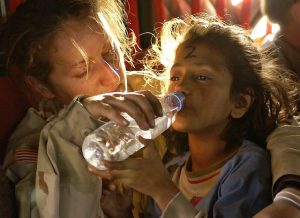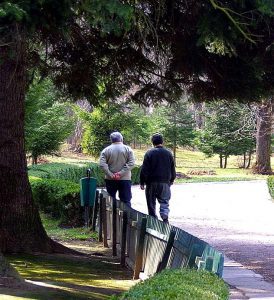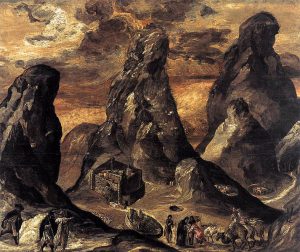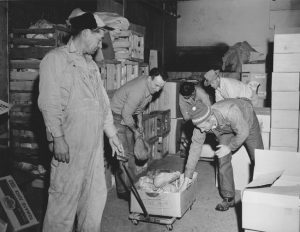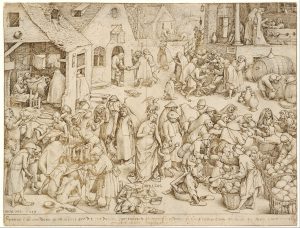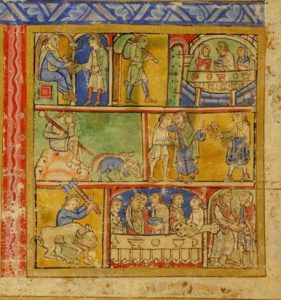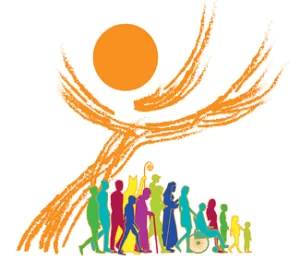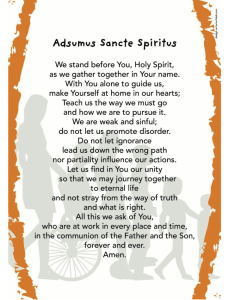Mercy: God’s Many Faceted Gift
Finding God In All The Wrong People
House of Sinners and Saints - Lutheran Church
Pastor Nadia Boltz-Weber describes her calling: "My job is to point to Christ and to preach the Gospel and to remind people that they're absolutely loved ... and all of their mess-ups are not more powerful than God's mercy."
For a fresh take on traditional Christianity in contemporary language enjoy this interview.
A Hymn for the Year of Mercy
Carly Paoli shares a vision of mercy.
A Word From Our Sponsor
"Always speak and act as men destined for judgment under the law of freedom. Merciless is the judgment on the man who has not shown mercy; but mercy triumphs over judgment.
My brothers, what good is it to profess faith without practicing it? Such faith has no power to save one, has it? If a brother or sister has nothing to wear and no food for the day, and you say to them, "Good-bye and good luck! Keep warm and well fed," but do not meet their bodily needs, what good is that? So it is with the faith that does nothing in practice. It is thoroughly lifeless."
James 2:12-17
Papa Francisco - Dejémonos Amar por Jesús
"Pero la misericordia de Dios puede hacer florecer hasta la tierra más árida, puede hacer revivir incluso a los huesos secos (cf. Ez 37,1-14).
He aquí, pues, la invitación que hago a todos: Acojamos la gracia de la Resurrección de Cristo. Dejémonos renovar por la misericordia de Dios, dejémonos amar por Jesús, dejemos que la fuerza de su amor transforme también nuestras vidas; y hagámonos instrumentos de esta misericordia, cauces a través de los cuales Dios pueda regar la tierra, custodiar toda la creación y hacer florecer la justicia y la paz."
Mensaje Urbi et Orbi del Santo Padre Francisco - Pascua 2013
Ask Theologika
Dear Theologika,
Why has the Church changed the name of the Sacrament of Penance (Confession) to Reconciliation? Isn’t it supposed to be about doing penance to make up for our sins?
Mary
Dear Mary,
The sacrament of Reconciliation has a long history, dating back to the 3rd century or earlier. It began as a way to deal with people who had committed one of three very serious sins — adultery, murder, or apostasy (denying the faith) — yet had repented and wanted to return to the community ... A process of returning to membership in the community was developed that involved public admission of guilt and public penance.
As part of the re-examination of the sacraments that occurred before and during the Second Vatican Council, the focus of the sacrament of Reconciliation was returned to roots more ancient even than those of the third century: Jesus’ actions in forgiving sins freely and lovingly.
Mission: Peacemaking and Muslim Christian Relations
Baptist missionary Jeremy Courtney, his wife, and two children found themselves in the middle of the Iraq War. In today’s attempt by some Moslems and Christians to demonize the other in a continuation of centuries of bloody warfare, Courtney has founded the Preemptive Love Coalition.
Courtney’s approach is to pursue peace one heart at a time.
Mercy and Forgiveness - Then and Now
“An eye for an eye and a tooth for a tooth” was an important advance in human relations at the time of Babylonian ruler Hammurabi around 1754 BCE. The Code of Hammurabi, like the codes of other ancient rulers, served as a guide for dealing with conflict and setting levels of responsibility or punishment for offenses.
Hebrew law was seen to come from God and included care of widows, orphans, and outsiders (“strangers”) in its scope. The concept of mercy and inclusion of forgiveness of debt were also part of the Mosaic Law. Jesus' call to his followers to be compassionate as the Father is compassionate continue to challenge us today.
Ponder with us the implications for today...
Who are the Poor?
Mercy is a two way street. God is merciful to each of us and we are called to pass on that gift to others. Seems like a one way street, but as we remember Jesus' words, "... as often as you did it for one of my least brothers, you did it for me," we see that the mercy we pass along is a return of the gift we have received to the divine giver. (Mt 25:40)
Michael Cain, in an article written for the Inland Register, reflects on his experience working with the St. Vincent de Paul Society in the Diocese of Spokane, WA. He describes three distinct categories within which the poor fall: generational, situational, and "invisible." Based on his many years of direct work with the poor in his community, he shares his insights into common characteristics of those living in poverty.
Our call to mercy includes service to those who do not have the basic necessities. Cain's insights apply across our nation and world.
The Corporal Acts of Mercy
The Corporal Works of Mercy are found in the teachings of Jesus and give us a model for how we should treat all others, as if they were Christ in disguise. They "are charitable actions by which we help our neighbors in their bodily needs" (USCCA). They respond to the basic needs of humanity as we journey together through this life.
What are these acts and how can we live them out? Read on ...
Spiritual Acts of Mercy
The Spiritual Acts of Mercy are drawn from Hebrew scriptures and tradition, Jesus' own tradition. The Spiritual Acts of Mercy are:
- To instruct the ignorant.
- To counsel the doubtful.
- To admonish sinners.
- To bear patiently those who wrong us.
- To forgive offenses.
- To console the afflicted.
- To pray for the living and the dead.
The United States Catholic Conference of Bishops offers practical ways in which we can practice these merciful actions in our daily lives.
Forgiveness and Mercy
What happens when you are the son of one of the world’s most notorious criminals? You say good bye to your father on the phone and get a call a few minutes later from the police from your father’s phone. What do you say when they tell you that they have just killed the man who loved you unconditionally with great tenderness?
Pope Francis - Let us be loved by Jesus
God's mercy can make even the driest land become a garden, can restore life to dry bones (cf. Ez 37:1-14).
So this is the invitation which I address to everyone: Let us accept the grace of Christ’s Resurrection! Let us be renewed by God's mercy, let us be loved by Jesus, let us enable the power of his love to transform our lives too; and let us become agents of this mercy, channels through which God can water the earth, protect all creation and make justice and peace flourish.
Theologian's Corner - What is Mercy?
The virtue of mercy is very prominent in Pope Francis' preaching and teaching. Many have embraced this call; but, what is mercy?
Mercy is the attitude or action of someone who could justifiably be uninvolved, superior, insensitive or disdainful. It implies that the person extending mercy goes out of her or his way to ignore whatever differences there may be between the self and others.
Looking Ahead
As we come to the end of the Holy Year of Mercy, we enter into a new liturgical year. We take what we have learned and experienced of mercy and carry it with us into this new year. Along the way, we'll celebrate many festivals and holy days as families and communities.
May these and other celebrations be reminders to us of God's great love and mercy in coming to be one of us.
Thanks to Our Contributors and Sources of Inspiration
Michael Cain for his reflections on the many dimensions and roots of poverty
Susan T. Mahan, PhD for her thoughts on Mercy
Pope Francis for his insights on mercy and for the gift of this Holy Year of Mercy which we have celebrated
The United States Catholic Conference of Bishops for their clear explanation of the Corporal and Spiritual Works of Mercy
And finally, we thank all the other folks whose lives and gifts of grace featured here have enriched our experience of God's love and mercy.
Share This Issue
Tweet
To use this for your worshiping community, please contact us.
Please visit our store, send your gift of support, and support our advertisers who help make this work possible. We appreciate your support and sharing of this e-zine with family and friends.


